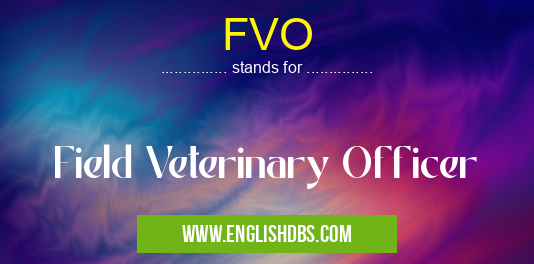What does FVO mean in VETERINARY
“FVO” is an acronym that stands for Field Veterinary Officer. A Field Veterinary Officer (FVO) is a person who provides medical care and support to animals in the field, often in remote locations and rural areas. FVO’s are highly knowledgeable about animal health and always act in the best interest of their patients when providing veterinary services. They assess the health needs of an animal, take preventive measures to protect it from environmental hazards, treat injuries and illnesses, perform surgical procedures, administer vaccinations and medications, and monitor the progress of recovery. FVO’s also educate pet owners about the importance of responsible pet ownership and may even teach classes on nutrition or general health care practices.

FVO meaning in Veterinary in Medical
FVO mostly used in an acronym Veterinary in Category Medical that means Field Veterinary Officer
Shorthand: FVO,
Full Form: Field Veterinary Officer
For more information of "Field Veterinary Officer", see the section below.
» Medical » Veterinary
Meaning & Purpose
An FVO provides important animal health care services for livestock owners by ensuring that all animals have access to quality medical treatment regardless of where they live or work. FVOs help reduce the incidence of disease outbreaks by quickly responding to reported cases of illnesses or injuries. Furthermore, they are responsible for monitoring the overall health of livestock herds and keeping track of any changes in population size or cross-breeding that could adversely affect production levels or increase susceptibility to particular diseases. FVOs can also collect information about cli\mical research studies underway in their area so that they can provide farmers with up-to-date information about advances in animal healthcare.
Essential Questions and Answers on Field Veterinary Officer in "MEDICAL»VET"
What is a Field Veterinary Officer?
A Field Veterinary Officer (FVO) is a professional who deals with preventative healthcare for farm animals and livestock. They are typically responsible for ensuring that animals are healthy, have adequate nutrition, and are properly managed in order to produce the maximum food yield possible. FVOs may also be involved in public health campaigns, research projects, or other veterinary-related activities.
What qualifications do FVOs need?
An FVO must have a doctorate degree in veterinary medicine and possess state-mandated licenses and certifications. Depending on their specialty, they may also require specialized training or experience with specific animal species.
What duties does an FVO perform?
Generally, an FVO's role consists of providing preventive care for farm animals and livestock. This includes monitoring animal health and welfare, performing clinical examinations, administering vaccinations, providing nutritional advice, diagnosing illnesses or diseases, maintaining records of treatments administered to individual animals or entire populations of animals, recommending corrective actions to improve animal care standards if necessary, and more.
Where can an FVO work?
An FVO typically works out in the field - this could be at a private farmstead, university research facility or laboratory setting, agricultural research institute or agency office. The workplace will vary depending on the scope of their assignment.
How does an FVO ensure animal safety?
An FVO helps to ensure animal safety through regular inspection visits as well as by educating farmers on proper animal husbandry practices such as disease control methods and sanitation protocols. They also provide advice on appropriate medical treatments for different species as well as recommend ways to address any welfare issues that arise during their inspections.
What types of diseases do FVOs diagnose?
FVOs diagnose a wide range of illnesses affecting farm animals including viral infections such as maedi-visna virus (MVV), bacterial infections such as Salmonellosis spp., parasitical infections such as Giardia sp., and nutritional imbalances resulting from poor nutrition habits in herd management.
Do you need special equipment for working with farm animals?
Specialized equipment is not always necessary when working with farm animals however there are some items such as syringes used for administering vaccines that would be considered essential items in most cases due to their crucial role within preventing disease outbreaks within a given group of livestock or poultry flocks etc.
Final Words:
Field Veterinary Officers play an essential role in providing comprehensive veterinary care while promoting public safety by carrying out regular inspections to identify areas at risk for disease transmission or zoonotic health concerns. They protect our food supply since most diseases affecting livestock can easily spread to humans as well as other animals if not detected early enough. Most importantly, FVOs ensure compassion for animals whose medical needs would otherwise go unmet due to financial constraints or physical distance from specialized facilities like hospitals or clinics.
